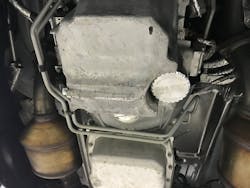The viability of reusable engine oil filters
Although the majority of fleets in the U.S. use conventional oil filters, the concept of “reusable filters” is gaining momentum. However, cost is seen as one of its major drawbacks. Reusable filters can easily justify the added expense over a conventional filter, but only if certain benefits are realized. So, what are those benefits and how can fleets determine if they are real? Here are the five questions to consider:
1. Can I extend my oil drain interval?
Extending oil drains is the most important way to justify the cost of a reusable filter, because the right reusable filter can extend oil drain intervals and save a fleet hundreds of dollars in oil and labor costs over the life of the vehicle. Many filter suppliers claim that their filter can double the life of the oil or more, but is it true? There is a simple way to assess their credibility: ask for the field test data that supports their claim.
2. Does the warranty cover something going wrong?
If any oil filter supplier can double the oil drain interval, they should be prepared to back it up with a performance guarantee. There are large differences between reusable oil filter warranties. Some offer minimal guarantees that cover the cost of the filter. But, what if something goes wrong with the engine and it’s an oil filter-related failure? Choose a reusable filter supplier that covers the repair or replacement of the engine if the filter supplier’s product is at fault.
3. Can a reusable filter provide better protection than a conventional filter?
HUBB Filters recommends using oil analysis as your primary evaluation tool. Oil analysis measures the performance of the filter in the real world. In contrast, lab tests can be designed to generate a specific outcome and almost all lab tests are based upon mil-spec fluid, versus actual oil.
For oil analysis, select an independent testing lab that has benchmarks to compare the performance of the reusable filter. Also, look for field testing data on the ability of the filter to provide fast oil flow at cold start-up and consistent flow during long periods of idling. This is when the engine is most vulnerable to excess wear and tear.
4. Is a reusable filter better for the environment?
The right reusable oil filter will reduce a fleet’s carbon footprint by reducing the amount of oil consumed by the fleet. The environmental “cost” of producing one quart of oil is five pounds of carbon, so the numbers add up quickly. In addition, a reusable oil filter can eliminate used oil filters going into landfills.
5. What do reusable filters cost?
Reusable filters can cost anywhere from $85 to $250 per unit. A higher priced filter does not mean it will necessarily be the best option. Focus on performance and value rather than cost. The right filter can easily justify the added expense.
Conclusion
Some reusable filter suppliers enable fleets to pay for filters on a monthly basis rather than as an outright purchase. This option matches the savings with the cost and reduces upfront investment.
Not all reusable filters are equal in terms of the technology behind them. Asking the right questions is crucial in helping fleets understand which reusable filter has the right benefits to justify the expense and anticipated performance.
Scott Killips is the CEO of HUBB Filters, Inc. HUBB is a reusable performance oil filter for passenger cars, light duty or medium duty trucks that use a spin-on filter. HUBB’s patented filter-in-a-filter design is made of surgical stainless steel filter weave, rather than paper that is used by conventional filters. Backed by independent third party testing from Automotive Testing and Development Services, Inc. (ATDS), HUBB filters are designed to last the lifetime of a vehicle, and are backed by an industry-first 100,000-mile performance guarantee.
